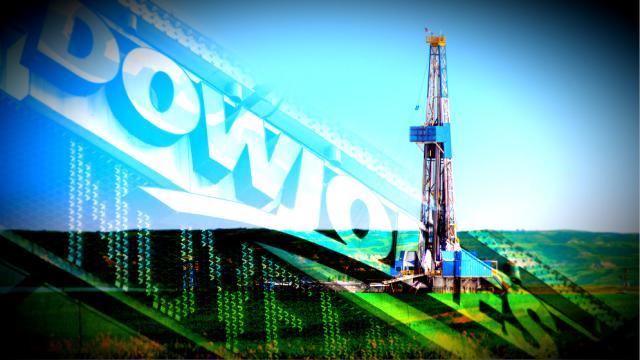
(Source: Hart Energy; Dow Jones logo image by Venturelli Luca / Shutterstock.com)
Exxon Mobil Corp. is getting booted off the Dow Jones Industrial Average after a nearly century-long run on the 30-stock benchmark, which analysts say reflects ongoing changes to the energy sector.
S&P Dow Jones announced on Aug. 24 the removal of Exxon Mobil, replacing the oil giant on its namesake industrial average with Salesforce.com, a San Francisco-based software company.
Exxon Mobil was the world’s largest by market cap less than a decade ago, noted Enverus analyst Stephen Graham.
“XOM’s (Exxon Mobil) removal comes as its 2Q update called into question the sustainability of its dividend and the company works to hit its $15 billion divestment target by the end of 2021,” Graham wrote in an Aug. 25 research note.
Along with Exxon Mobil, the Dow said it will also replace Pfizer Inc. and Raytheon Technologies Corp., effective prior to the opening of trading on Aug. 31. The index changes were prompted by Apple Inc.’s decision to split its stock 4:1, which reduced the index’s weight in the technology sector, according to a release from Dow.
Mike Bradley, managing director and senior equity salesperson at Tudor, Pickering, Holt & Co. (TPH), called the change the biggest Dow has ever had.
“It’s significant because Exxon was added to the Dow in 1928 as Standard Oil and is the longest surviving member of the Dow,” Bradley said on Aug. 25 during a video discussion hosted by TPH.
Diving deeper, Bradley noted that, in 2007, Exxon Mobil was worth roughly $525 billion, making it not only the largest company in the world but the largest component on the index at the time. Though, by 2014, the company’s market cap fell to around $425 billion.
Fast forward to today and Exxon Mobil’s market cap has plunged to around $180 billion, which Bradley described as a template of what’s happened in energy over the last couple of years.
“It’s obviously systematic of what’s going on in energy right now,” he said. “Energy as a percentage on a lot of indexes have fallen down 2.5%-3%, so this is sort of a natural progression.”
The removal of Exxon Mobil also will leave Chevron Corp. as the only supermajor on the index. Bradley explained the reason Exxon Mobil was removed and not Chevron is because the Dow is a price weighted index instead of a market cap weighted index.
“Chevron’s market cap is actually smaller than Exxon, but Exxon’s stock price is half that of Chevron so that’s why Exxon got removed,” he said.
Bradley also added that he expects to see a modest amount of volume traded out of Exxon Mobil because of the removal.
Recommended Reading
Utica Oil’s Infinity IPO Values its Play at $48,000 per Boe/d
2025-01-30 - Private-equity-backed Infinity Natural Resources’ IPO pricing on Jan. 30 gives a first look into market valuation for Ohio’s new tight-oil Utica play. Public trading is to begin the morning of Jan. 31.
Utica’s Infinity Natural Resources Seeks $1.2B Valuation with IPO
2025-01-21 - Appalachian Basin oil and gas producer Infinity Natural Resources plans to sell 13.25 million shares at a public purchase price between $18 and $21 per share—the latest in a flurry of energy-focused IPOs.
Artificial Lift Firm Flowco’s Stock Surges 23% in First-Day Trading
2025-01-22 - Shares for artificial lift specialist Flowco Holdings spiked 23% in their first day of trading. Flowco CEO Joe Bob Edwards told Hart Energy that the durability of artificial lift and production optimization stands out in the OFS space.
Alliance Resource Partners Adds More Mineral Interests in 4Q
2025-02-05 - Alliance Resource Partners closed on $9.6 million in acquisitions in the fourth quarter, adding to a portfolio of nearly 70,000 net royalty acres that are majority centered in the Midland and Delaware basins.
Chevron Names Laura Lane as VP, Chief Corporate Affairs Officer
2025-01-13 - Laura Lane will succeed Al Williams in overseeing Chevron Corp.’s government affairs, communication and social investment activities.
Comments
Add new comment
This conversation is moderated according to Hart Energy community rules. Please read the rules before joining the discussion. If you’re experiencing any technical problems, please contact our customer care team.





